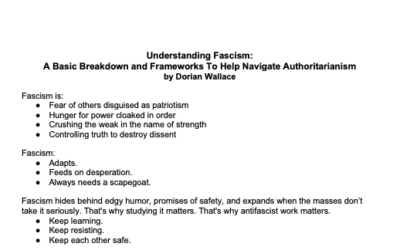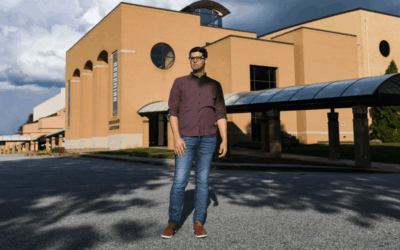ESSAYS
The Knowledge Bank at the Lalich Center is a comprehensive repository designed to empower survivors, families, and professionals with valuable insights into cults and coercive relationships. Our mission is to provide accessible resources that foster understanding and support recovery.
Below are some reviews that offer critical analyses of literature, media, and tools related to cult dynamics and recovery processes. By evaluating these materials, we aim to guide you toward resources that are both credible and beneficial on your healing journey.
Disclaimer: The authors of the posts in this section of our website are responsible for the contents and are solely responsible for opinions expressed therein.
Understanding Fascism: A Basic Breakdown and Frameworks To Help Navigate Authoritarianism by Dorian Wallace
READ THE FULL PDF HERE Fascism is: Fear of others disguised as patriotism Hunger for power...
How Cult Techniques Infect Corporate Training, Coaching, and Therapy Programs
by Jenni Walford - provokarte.com - Art-based Training in Awareness of Cult Dynamics in Business...
Ultimate Critical Thinking Cheat Sheet. National Geographic Education Blog By Carlisle
carylsue. (2017, January 20). Ultimate critical thinking cheat sheet. National Geographic...
‘God, Please Fix Me’: Inside The Dangerous Resurgence of ‘Ex-Gay’ Conversion Therapy
Rob Picheta remembers walking towards the worst experience of his life. The dorm hall was a...
Cult Psych – Loaded Language: Demystifying Commonly Used Terms
Psychologist Maria Esquerra shares a great collection of terms and language used by cults and cult...
Cults and the Law- Phil Elberg
Phil Elberg shares with us a document that explores the intersection of legal practice and...
David Berg’s Perversion of Biblical Bridal Theology in the Children of God / The Family
Perry Bulwer examines the religious concept of mystical marriage between GOD and believers in the...
The Cult of Two: How Relationships Can Mirror a Cult – and the Interplay of Narcissism and Gaslighting
Dr. Robin S. Stein explores how certain intimate relationships can resemble cult dynamics,...
Cult and Brainwashing: The hidden – and not so hidden – epidemic
Alexandra Stein is a writer and lecturer specializing in the social psychology of cults,...
Bounded Choice – The Illusion of Autonomy in High-Control Systems – A Tribute to Philip Zimbardo
This essay was written in honor of Dr. Philip Zimbardo, who died on October 14, 2024, at 91. Dr....
Recognizing Coercive Control
Keely Griffin and Andrew Pledger write about how sociologist Evan Stark coined the term "coercive...
A Message About Our Special Course: The Impact of Donald Trump on America – A Cultic Studies Perspective
Taking a stand against Donald Trump as a public facing therapist and therapeutic trainer is not...















